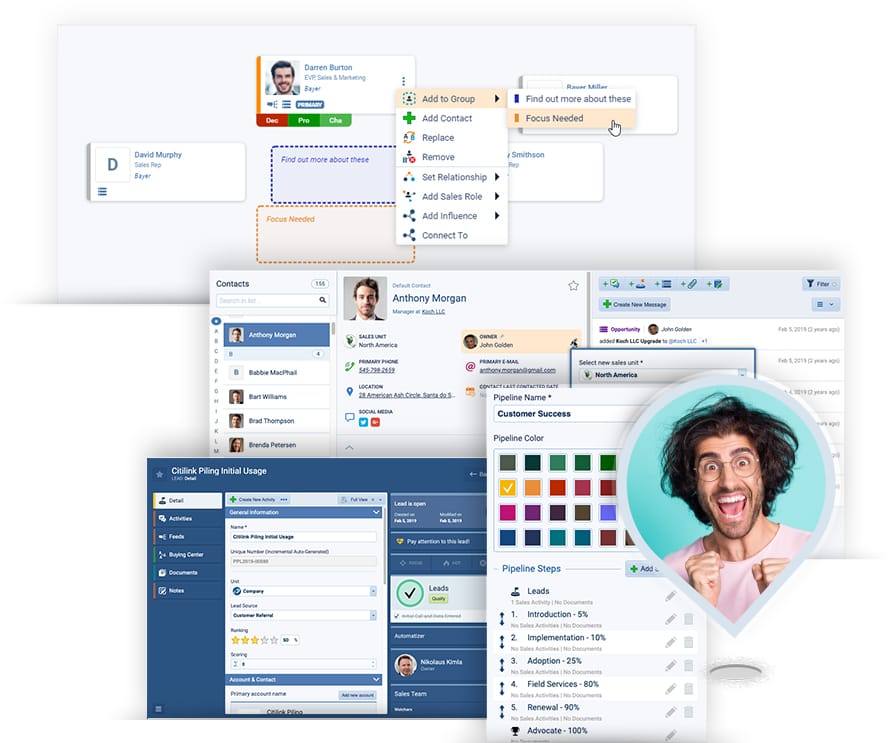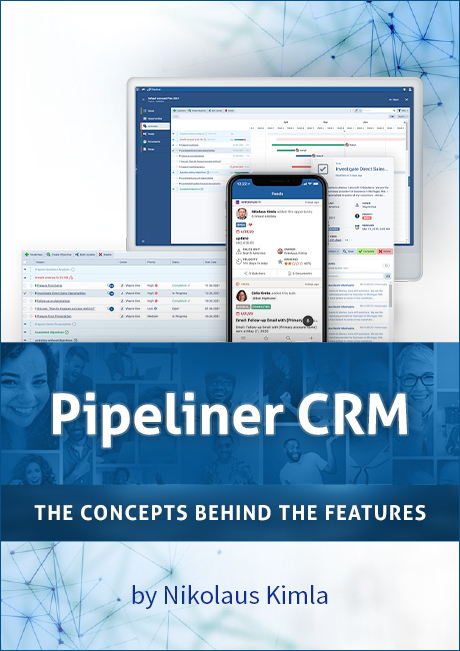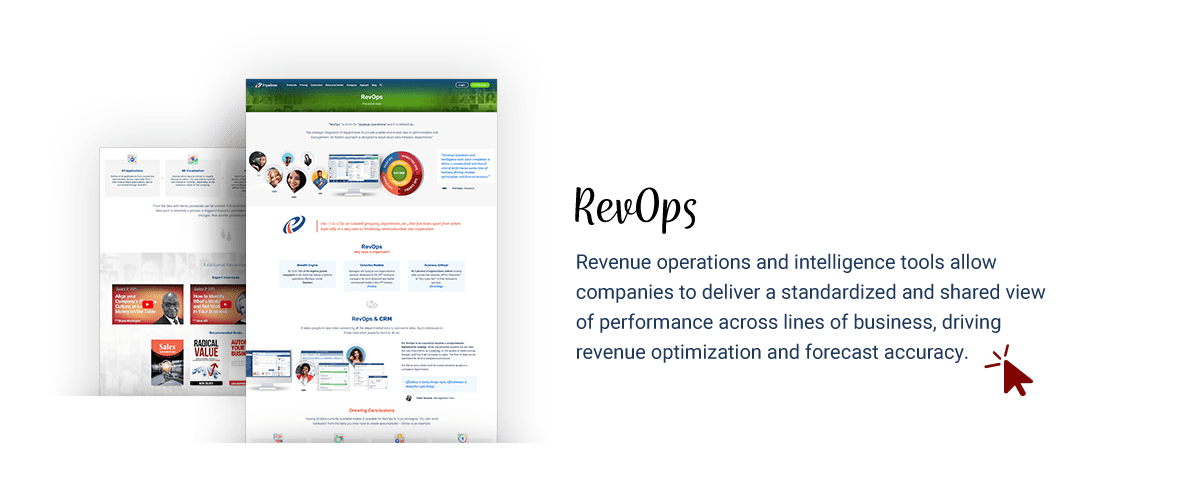Team Collaboration
What is CRM
- What is CRM?
- Customer Relationship Management Software
- Account Management Software
- Contact Management Software
- Sales Lead Management
- Opportunity Management
- Sales Pipeline Management
- Customer Relationship Mapping
- Sales Enablement Tools
- Sales Management Software
- Sales Process
- Sales Reporting
- Task Management
- Custom Fields
- Team Collaboration
- KPIs for Sales & Leading and Lagging Indicators
- CRM Past Failures?
Team Collaboration in Sales and MarketingMarketing Marketing is the field, set of actions, or practice of making a product or service desirable to a target consumer segment, with the ultimate aim of effecting a purchase.
Team collaboration is a team and project management approach in which individuals with complementary skills work cooperatively to achieve defined shared objectives. This approach is defined by the equal participation of all individuals involved in various stages of the work processes, as well as shared responsibility for the outcomes.
„What is Team Collaboration?“
Collaboration is essential when multiple teams are working with different customers to improve the customerCustomer Customer is an individual or an organization that purchases a product or signs up for a service offered by a business. experience. Teams can work together to share information such as competitor selling strategies or new campaigns discovered during customer visits. When your teams work together, they have better information to tailor assortments to your customers’ needs, which improves customer loyalty, business revenueRevenue Revenue is the amount of money a business generates during a specific period such as a year or a quarter; also called sales., and overall shopping experience.
Team collaboration can occur on a single cross-functional team as well as between different specialized teams. Team collaboration can be: depending on how it is carried out.
Synchronous
Participants interact in real time, whether in a shared office space or via online meetings, messagingMessaging Messaging is the process of communicating your brand’s value proposition, the benefits you offer, and the perceived meaning of such communication among your target audience. apps, and so on.
Asynchronous
Asynchronous interaction occurs at different times, such as when participants collaborate on shared online documents, contribute to a shared knowledge base, review and comment on the work of others, and so on.
Vital Elements
A productive workflow between participants is enabled by a number of quality practices that underpin effective team collaboration. There are various classifications depending on the source, but we have narrowed down what we believe to be the five key elements of healthy and efficient collaboration:
Communication
Coordination
Transparency
Accountability
Trust
Why It Matters
Many firms must collaborate due to the increasingly complicated nature of work that depends on a variety of specialized abilities. However, companies of all sizes stand to gain from promoting collaborative processes as they are not only dependent on the synergy of different skill sets.
The benefits of collaboration are enormous and cut across many important operational areas. This ranges from business results to knowledge transfer, staff retention, and beyond.
None of us is as smart as all of us.
 Ken Blanchard
Ken BlanchardBenefits
team collaboration software is an excellent way to bring the team together because it centralizes all of the necessary tools. Pipeliner CRM, for example, is an all-in-one collaboration platform that includes team messaging, video conferencingVideo Conferencing Video Conferencing refers to the technology behind or the act of establishing a visual connection between two or more people positioned in different locations to facilitate remote communication., and file sharing in addition to project management tools.
Here are some of the most significant ways that team collaboration generates value
Collaboration is always a learning opportunity. Team collaboration brings together people with diverse backgrounds and skill sets.
Diverse skill sets among collaborators imply diverse perspectives. The ability to approach a problem from various perspectives improves the team’s collective problem-solving abilities by introducing new perspectives. The team’s ability to come up with novel ideas and look for fresh solutions to old problems consequently improves.
Increase EngagementEngagement Engagement is the state or process of keeping a specific class of audience (employees, management, customers, etc.) interested about a company or brand and invested in its success because of its perceived relevance and benefits to the audience. › Active collaboration brings people together and increases their involvement in their work and the overall organizationOrganization Organization is a cohesive group of people working together and formally bound by a shared identity (e.g., one team, company, club, etc.) and a common purpose (e.g., business growth, athletic victory, etc.).. Employees who work independently most of the time are much less likely to feel fully committed to their company.
Increase Efficiency › Through the equitable distribution of work and the emphasis of team members on tasks that benefit most from their knowledge and experience, collaboration increases efficiency. It also allows teams to solve problems faster and find innovative solutions to pressing questions, increases collective knowledge, and leads to higher levels of motivation and dedication among team members.
Experience Pipeliner CRM Now
Collaborative CRM
Collaborative CRM enables communication between various organizations involved in customer service. CRM collaboration can include different company divisions such as marketing, sales, customer service, technical support, external customers, vendors, and distributors.
A fully collaborative CRM system would enable managers and supervisors to interact and exchange concepts, ideas, workloads, and tasks with both their superiors and their employees.
The concept of workplace collaboration is not new, and it is constantly redefined as new technological innovation enters the market. CRM vendors can now offer comprehensive cloud-based collaborative CRM software solutions that leverage the Internet’s power as a unified business platform thanks to advancements in cloud technology.
Collaborative Documents
Modern business processes often include documents created collaboratively. Such documents are normally kept in shared folders on commonly accessible servers or, today, even in the cloud.
Such collaboration applies as well to a sales force. Two or more sales reps may collaborate on a document or a presentation, also allowing for editing, polishing or input from sales assistants or even sales management.

Within CRM
Sales reps are different from other collaborative groups within a company. They are commonly working within a CRM, and it is becoming more common for CRM to contain features that support salespeople — as opposed to CRM simply being a receptacle of dataData Data is a set of quantitative and qualitative facts that can be used as reference or inputs for computations, analyses, descriptions, predictions, reasoning and planning. obtained from sales reps.
It makes far more sense for the CRM solutionSolution Solution is a combination of ideas, strategies, processes, technologies and services that effectively helps an organization achieve its goals or hurdle its challenges. to facilitate the saving and storage of those documents right in the CRM. Therefore, collaboration on—and use of—such documents can occur without them ever having to leave the CRM system.
A CRM solution that is truly modern will not only allow collaboration and storage of such documents in CRM generally but importing them to the particular step of the sales process to which they apply. For individual sales, this can mean that any sales rep can come along, pick up a sale with which they weren’t previously familiar and immediately access all documentation pertaining to that sale.
Ensure your CRM solution allows for full collaboration. Save time and energy—and increase sales as a result.
App Integration
Of course, none of this will work if the CRM application in use at a particular company does not have full and complete integration with the various applications in use to create, collaborate on and store such documents. Today these are many and include MS Office tools, Dropbox, Google Drive, and others. Sales reps already have team collaboration tools they are familiar with and are using. They will continue to use them whether the CRM system will accommodate them or not. It well behooves everyone involved if the CRM solution is compatible with all of these tools in the first place.
Integration with other common marketing tools should also be possible, such as those used for mailing lists, contact management, lead generationLead Generation Lead Generation is a set of activities aimed at generating interest around a product or service through methods such as 1. content marketing (blogging, podcasts, free downloads); 2. advertising (PPC, banner ads, Yellow Pages, sponsoring an event); 3. referrals (recommendations from existing customers and other people); 4. outbound marketing (cold email, cold calling), and 5. partnerships (joint ventures, affiliate marketing). programs, email marketing tools, campaign response management programs, and others.




